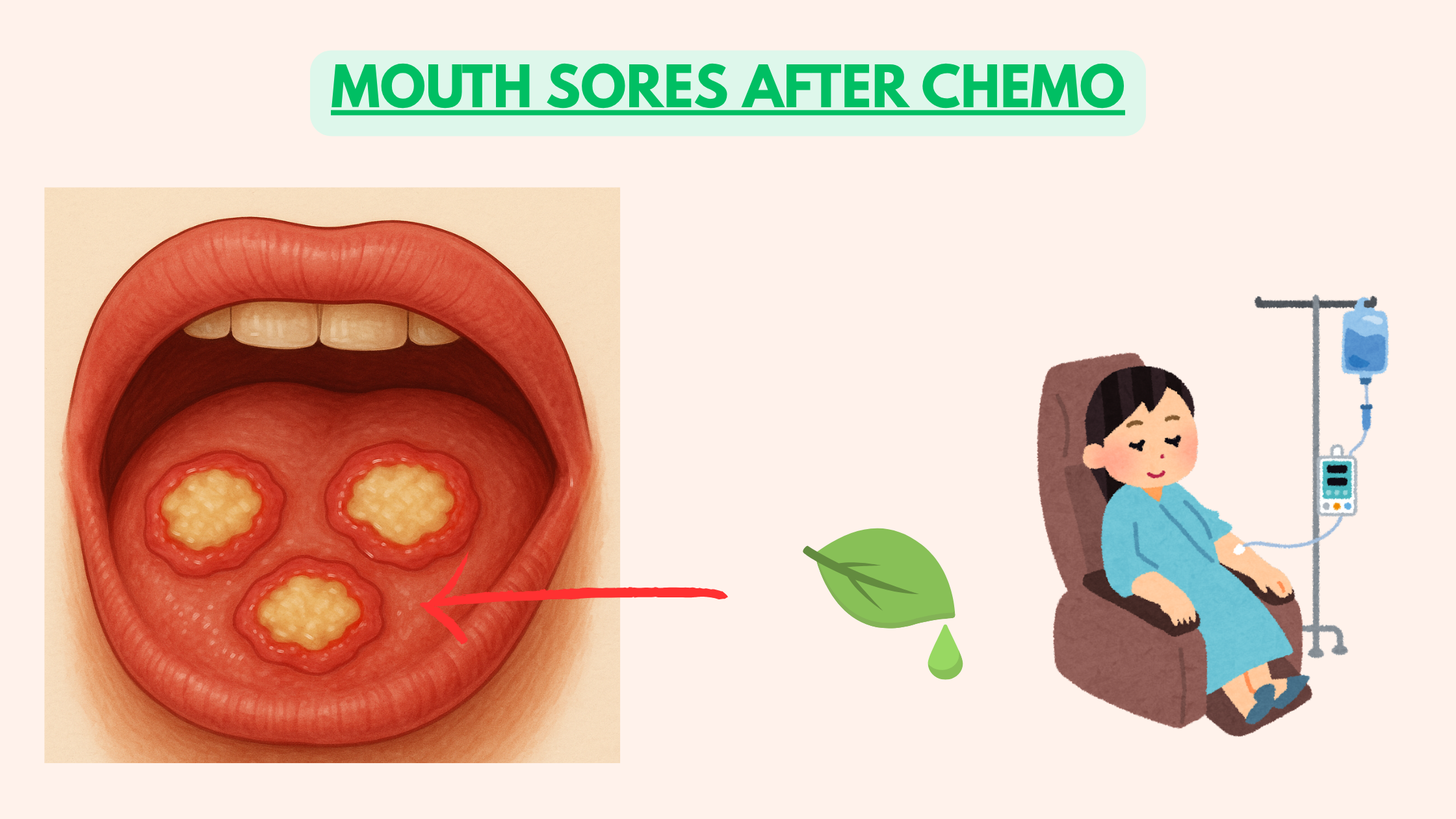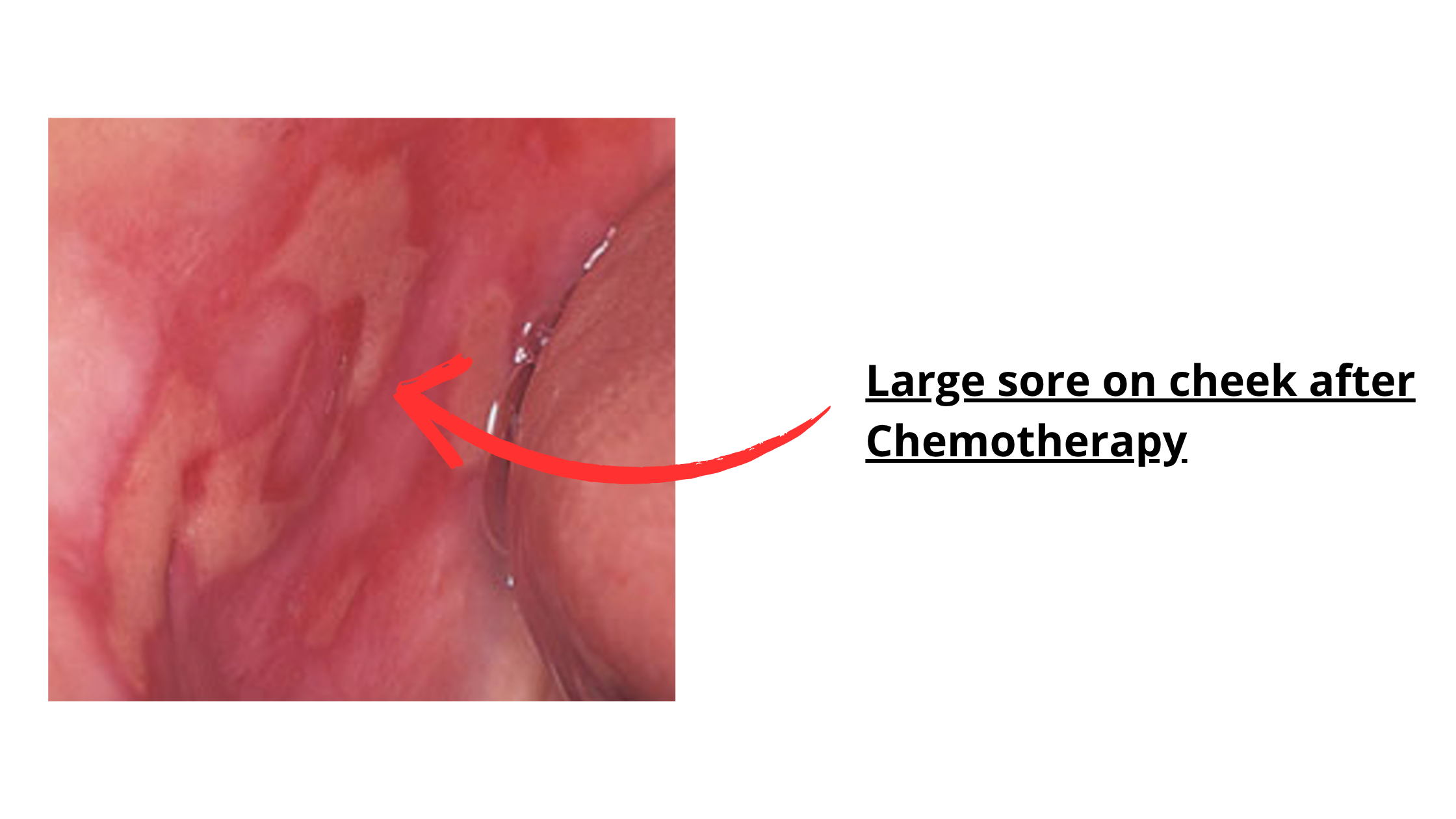Mouth Sores During Chemotherapy? Here’s What You Need to Know

As a result, many people experience mouth sores, inflammation, digestive issues, and a higher risk of mouth infections—especially during the first few weeks of treatment.
These side effects can make eating difficult and getting the nutrients your body needs even harder. That’s why it’s so important to manage them early.
In this post, we’ll break down how chemotherapy affects your mouth, the symptoms to watch for, who’s most at risk, and the best ways to prevent and treat them quickly.
In this article...
How Does Chemotherapy Affect the Mouth?
Around 40% of people undergoing chemotherapy develop a condition called oral mucositis, which simply means inflammation of the lining of the mouth. This number can rise to 90% for patients with cancers in the head or neck area, especially when chemotherapy is combined with radiation therapy.Symptoms usually start within 3 to 7 days after the first round of chemotherapy. As the fast-dividing cells in the mouth are affected, the lining becomes thinner, inflamed, and much more sensitive.
Another common side effect of chemotherapy is a drop in blood cell counts—especially white blood cells and platelets.
White blood cells are essential for fighting off infections. When their numbers go down, the mouth becomes more vulnerable to infections. This can lead to an overgrowth of bacteria and yeast, most often resulting in mild gum inflammation. However, severe oral infections can sometimes occur, especially if the white blood cell count falls sharply.
The role of platelets is to form blood clots and stop bleeding. When platelet counts fall, it’s not unusual for the gums to start to bleed easily, sometimes even on their own or when doing something as simple as eating or brushing your teeth.
Fortunately, these side effects are usually self-limiting and temporary. Within 2 to 3 weeks after stopping chemotherapy, blood cell counts begin to return to normal, and the mouth starts to heal on its own.
Symptoms of Mouth Sores Caused by Chemotherapy
Mouth sores caused by chemotherapy can range from mild redness and irritation to large, painful ulcers that make eating and speaking difficult.
Here’s a breakdown of the most common symptoms and how they typically progress after starting chemotherapy:
- Days 3 to 5: The mouth lining becomes thin, red, inflamed, and noticeably more sensitive (especially to spicy and hot foods).
- Following days: As the inflammation worsens, painful sores or ulcers may appear. These are often large, yellowish, and have irregular margins. Sometimes, the outer layer of the mouth lining begins to peel away.
- Infections can occur: These sores can easily become infected—especially by yeast (fungal infection). A common sign to look for is a thick, white, creamy coating in the area that’s easy to wipe off. The treatment of choice is usually topical antifungal applications.
- Recovery: Usually, within 2 to 3 weeks after stopping chemotherapy, the inflammation goes down, the ulcers heal, and the mouth lining gradually returns to its normal, healthy state.
Can You Prevent These Mouth Sores?
Unfortunately, there is no way to predict whether you will develop mouth sores after chemotherapy, or how severe they will be. And while they cannot be completely prevented or cured, the good news is that there are ways to reduce their severity, relieve discomfort, and speed up healing.The goal is to help you eat more comfortably and maintain a nutritious, balanced diet during your treatment.
Here are some helpful recommendations:
All Dental Problems Should Be Addressed Before Treatment
Before starting chemotherapy, it’s important to take care of any existing dental issues—like cavities, gum disease, infections, or dry mouth.
There are two reasons for this:
- Chemotherapy can make existing dental problems worse.
- Delaying dental treatment after the start of chemo isn’t ideal, as your body’s healing ability is reduced and recovery may be slower and less effective.
Good Oral Hygiene
Maintaining a clean and healthy mouth can prevent many troubles during chemotherapy. Some tips include:
- Brush gently with a soft or even extra-soft toothbrush after every meal.
- The worst thing you can do is injure or hurt your mouth:
- Avoid electric toothbrushes (they offer less control than manual ones).
- Use dental floss and other interdental tools cautiously, as these can easily hurt your gums.
- Avoid toothpicks.
- Use a mild, non-abrasive toothpaste.
- A dry mouth is sensitive and more prone to irritation. So if there's one thing to remember, it's to drink, and drink a lot. Keeping the mouth moist can help reduce discomfort and prevent irritation. Here are a few tips:
- Stay hydrated throughout the day (at least 2 liters of water daily).
- Chew sugar-free gum to stimulate saliva production.
- Use saliva substitutes or moisturizing mouth sprays if needed.
A Healthy, Soft Diet
Choose blended, soft, liquid, cold, or lukewarm options, and stay away from anything that can make the sores worse, such as hot, spicy or acidic foods.
Simply sucking on something icy can bring relief.
Below are examples of good and bad choices.
Foods to eat
- Ice cream
- Dairy-based desserts (like yogurt or custard)
- Mashed or pureed cooked vegetables
- Soft, blended meat or fish
Foods to avoid
- Too hot, spicy, or acidic foods and drinks (such as hot chili, citrus fruits, vinegar, or mustard)
- Hard or crunchy foods (like potato chips or toast)
- Fried, dry, or salty foods (like crackers and peanuts)
How Are Chemotherapy-Induced Mouth Sores Treated?
As mentioned before, there’s no specific cure for chemo-related mouth sores—but they’re temporary and usually heal on their own.Treatment mainly focuses on:
- Easing pain and speeding up healing
- Reducing inflammation
- Preventing or treating infections when they occur
Common Treatment Options:
There are several treatment protocols, but the most commonly used include:
- Mouthwashes, especially sodium bicarbonate (baking soda) 5% and chlorhexidine 0.12%
- Topical numbing agents such as Orajel (for pain relief)
- Topical corticosteroids (to reduce inflammation)
Baking soda is one of the most effective and affordable remedies for relieving mouth sores during chemotherapy. Rinsing your mouth several times a day with baking soda helps neutralize oral acidity, reduces inflammation, and slows the growth of harmful bacteria and yeast. It is also low-cost and has no side effects.
Other Treatments:
There are several other treatment approaches depending on your specific symptoms. For example, your dentist or doctor may recommend:
- Painkillers combined with systemic corticosteroids, if the pain and inflammation are severe
- Antibiotics for bacterial infections
- Antifungal medications for yeast infections (like oral thrush)
- Antivirals for viral infections
Sources
- Chemotherapy-Induced and/or Radiation Therapy-Induced Oral Mucositis—Complicating the Treatment of Cancer - PMC
- Prevention and the treatment of oral mucositis: the efficacy of sodium bicarbonate vs other agents: a systematic review - PMC
- The efficacy of two different oral hygiene regimens on the incidence and severity of oral mucositis in pediatric patients receiving hematopoietic stem cell transplantation: A prospective interventional study - PMC
- Mucites-remis-AFSOS-NOVARTIS-2015.pdf